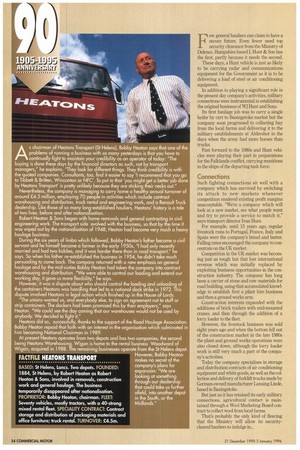A s chairman of Heatons Transport (St Helens), Bobby Heaton says
Page 56

If you've noticed an error in this article please click here to report it so we can fix it.
that one of the problems of running a business with so many yesterdays is that you have to continually fight to maintain your credibility as an operator of today: "The buying is done these days by the financial directors as such, not by transport managers," he explains. "They look for different things, They think credibility is with the quoted companies. Consultants, too, find it easier to say 'I recommend that you go to Tibbett & Britten, Wincanton or NFC'. To put in that 'you might get a better job done by Heatons Transport' is pretty unlikely because they are sticking their necks out."
Nevertheless, the company is managing to carry home a healthy annual turnover of around £4.5 million, employing 70 people in activities which include contract warehousing and distribution, truck rental and engineering work, and a Renault Truck dealership. Like those of so many long-established. hauliers, Heatons' history is a tale of two lives: before and after nationalisation.
Robert Heaton & Sons began with home removals and general contracting in civil engineering work. The transport side evolved with the business, so that by the time it was wiped out by the nationalisation of 1948, Heaton had become very much a heavy haulage business.
During the six years of limbo which followed, Bobby Heaton's father became a civil servant and he himself became a farmer in the early 1950s. "I had only recently married and had two kiddies, and it was harder there than in road transport," he says. So when his father re-established the business in 1954, he didn't take much persuading to come back. The company returned with a new emphasis on general haulage and by the mid-sixties Bobby Heaton had taken the company into contract warehousing and distribution, "We were able to control our loading and extend our working day, it gave us more flexibility," he says. However, it was a dispute about who should control the loading and unloading of the containers Heatons was handling that led to a national dock strike in 1972. This dispute involved Heatons in legal action which finished up in the House of Lords. "The unions wanted us, and everybody else, to sign an agreement not to stuff or strip containers. The dockers had been promised this by their employers," says Heaton. "We could see the day coming that our warehouses would not be used by anybody. We decided to fight it." Heatons did so, successfully, thanks to the support of the Road Haulage Association. Bobby Heaton repaid that faith with an interest in the organisation which culminated in him becoming National Chairman in 1989. At present Heatons operates from two depots and has two companies, the second being Heatons Warehousing. Wigan is home to the rental business Woodward of Wigan, acquired in 1988. The remaining businesses operate from the St Helens depot. However, Bobby Heaton makes no secret of the company's plans for expansion: "We are looking at something through our dealership that could take us further afield, into another depot in the South, or the Midlands."
FACIFILE NEATONS TRANSPORT BASED: St Helens, Lancs. Two depots. FOUNDED: 1884, St Helens, by Robert Heaton as Robert Heaton & Sons, involved in removals, construction work and general haulage. The business temporarily disappeared after nationalisation. PROPRIETOR: Bobby Heaton, chairman. FLEET: Seventy vehicles, mostly tractors, with a 40-strong mixed rental fleet. SPECIALITY CONTRACT: Contract storage and distribution of packaging materials and office furniture; truck rental. TURNOVER: E.4.5m.




























































































































